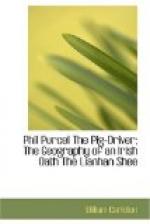There was nothing remarkable in the passage, unless that every creature on board was sea-sick, except the pigs; even to them, however, the change was a disagreeable one; for to be pent up in the hold of a ship was a deprivation of liberty, which, fresh as they were from their native hills, they could not relish. They felt, therefore, as patriots, a loss of freedom, but not a whit of appetite; for, in truth, of the latter no possible vicissitude short of death could deprive them.
Phil, however, with an assumed air of simplicity absolutely stupid, disposed of them to a Yorkshire dealer at about twice the value they would have brought in Ireland, though as pigs went in England it was low enough. He declared that they had been fed on tip-top feeding: which was literally true, as he afterwards admitted that the tops of nettles and potato stalks constituted the only nourishment they had got for three weeks before.
The Yorkshireman looked with great contempt upon what he considered a miserable essay to take him in.
“What a fule this Hirishmun mun bea;” said he, “to think to teake me in! Had he said that them there Hirish swoine were badly feade, I’d ha’ thought it fairish enough on un; but to seay that they was oll weal feade on tip-top feeadin’! Nea, nea! I knaws weal enough that they was noat feade on nothin’ at oll, which meakes them loak so poorish! Howsomever, I shall fatten them. I’se warrant—I’se warrant I shall!”
When driven home to sties somewhat more comfortable than the cabins of unfortunate Irishmen, they were well supplied with food which would have been very often considered a luxury by poor Paddy himself, much less by his pigs.




